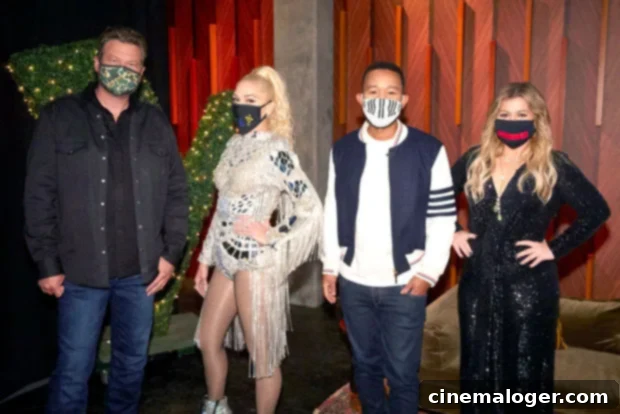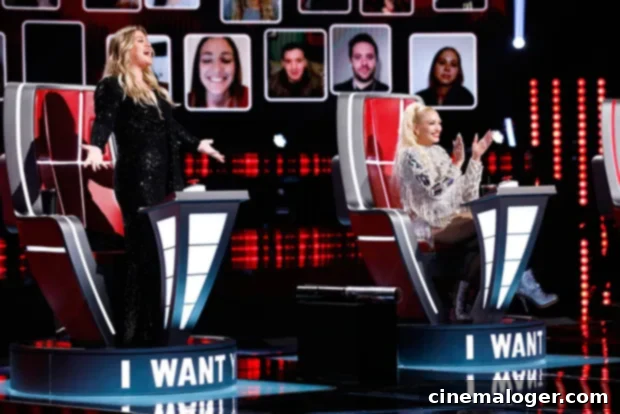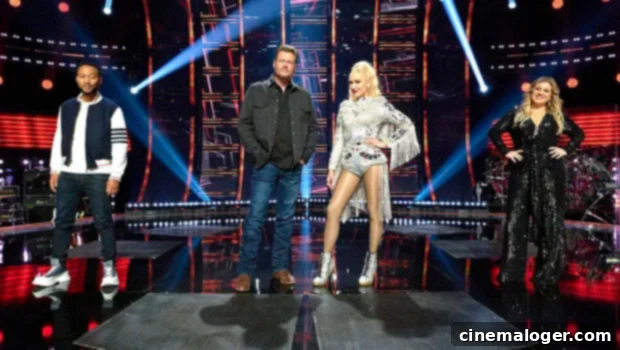The Unstoppable Return: How ‘The Voice’ Season 19 Defied the Pandemic with Unprecedented Safety and Resolve
In an extraordinary year marked by global challenges, the resilience of the entertainment industry shone brightly, especially with the highly anticipated return of NBC’s acclaimed singing competition, The Voice. Season 19 premiered on October 19, 2020, amidst a landscape where many productions faced indefinite delays or outright cancellations due to the COVID-19 pandemic. However, for the team behind The Voice, pausing was never an option. Executive Producer Audrey Morrissey confirmed that discussions about “skipping a season or pushing it” were simply off the table, embodying a profound commitment to delivering entertainment when it was arguably needed most.
The 2020 fall TV season presented unprecedented hurdles for creators and crew alike, as shows grappled with filming amid an ongoing global health crisis. Among the programs that successfully navigated these complex waters was The Voice. The previous season had already seen a radical shift, with its live shows transitioning entirely to a virtual format – a pioneering move that offered valuable lessons for future productions. Building on this experience, Season 19 took a decisive step forward, returning to an in-studio setting, meticulously equipped with rigorous safety protocols designed to protect everyone involved.
A Vision of Resilience: Audrey Morrissey’s Unwavering Commitment
While many might have understood a decision to postpone the season until 2021, Executive Producer Audrey Morrissey viewed such a delay as an unacceptable alternative. In her conversations with the media, including HollywoodLife, Morrissey emphasized that canceling Season 19 was not “on many people’s minds” within the production team. Her philosophy was clear and proactive: “You just have to manifest things and keep positive and just know that where there’s a will, there’s a way we could figure it out,” she articulated. This optimistic yet pragmatic approach underscored the determination that characterized the show’s return. While acknowledging the potential for dramatic pushes, she and her team chose to focus on solutions rather than obstacles.

Morrissey further elaborated on the collective mindset, stating there was “never any conversation about pushing it, and I think part of the reason that didn’t happen is we just did it.” This speaks volumes about the proactive nature of the production. Instead of dwelling on hypothetical cancellations, the team plunged into problem-solving. “There was no time that I was ever talking with anybody at NBC about skipping a season or pushing it,” she affirmed. Her discussions and personal mindset were consistently centered on actionable strategies: “‘OK, well if this happens, we’ll do this, and we’re working on plans with this, and I’m talking to these people about this technology.’ It was like, we’re doing it. It’s just a matter of how.” This unwavering focus on execution, coupled with a willingness to embrace new technologies and methodologies, was pivotal in ensuring the show’s continuity.
Prioritizing Safety: The New Normal on Set
The paramount concern, as Audrey Morrissey highlighted, was to maintain the essence of The Voice—”the show everybody loves”—while simultaneously guaranteeing the highest level of safety for everyone involved, both in front of and behind the cameras. This commitment translated into an exhaustive implementation of health protocols. Morrissey revealed that the entire set operated with absolute vigilance, particularly regarding safety measures, including the “religious” testing of all coaches. This goes beyond mere compliance; it signifies a culture of responsibility and care that permeated every aspect of production. Details such as social distancing within the iconic red chairs, modified stage setups, increased sanitization, and potentially virtual interactions for non-essential personnel became the new norm, all working together to create a secure environment.

Adapting the Format: From Blind Auditions to Live Shows
Producing a talent competition like The Voice, which thrives on close interactions, live performances, and audience energy, presented unique challenges during a pandemic. The show’s structure, typically involving blind auditions, battle rounds, knockouts, and finally, live playoffs, required significant adjustments. For Season 19, The Voice wisely front-loaded its production schedule, mostly completing the filming of all pre-live show episodes before their air dates. This strategy allowed for greater control over the filming environment, enabling stricter enforcement of protocols during the more contained, earlier stages of the competition.
The blind auditions, a cornerstone of the show, traditionally feature a large, enthusiastic studio audience. For Season 19, this dynamic had to be reimagined. While the exact details of audience participation were adapted to ensure safety – potentially involving a socially distanced virtual audience, or a significantly reduced, tested, and distanced live audience – the core excitement of the artists performing for the coaches remained paramount. Similarly, the battle rounds and knockouts, which involve direct coaching and often duets, necessitated innovative staging and interaction methods to maintain both the integrity of the competition and the health of the participants.
The Star-Studded Coaching Panel Returns
A major draw for The Voice has always been its dynamic and beloved panel of coaches. For Season 19, fans were thrilled to see the return of music icons Blake Shelton, Gwen Stefani, John Legend, and Kelly Clarkson. Each coach brings a unique blend of expertise, humor, and competitiveness that defines the show’s spirit. Their presence was crucial for maintaining a sense of normalcy and continuity for viewers during an uncertain time. Blake Shelton, the show’s longest-running coach, continued to bring his signature wit and country music acumen. Gwen Stefani’s return to the panel alongside her then-fiancé Blake added an extra layer of personal dynamic that viewers cherished. John Legend offered his unparalleled musical artistry and thoughtful mentorship, while Kelly Clarkson, known for her vibrant energy and powerful vocals, continued to be a formidable and inspiring presence.
The coaches’ commitment to the show extended beyond their musical talents; it also encompassed their willingness to adapt to the new safety requirements. This meant undergoing regular testing, maintaining social distance from each other and the artists, and potentially adjusting their coaching styles to fit the new on-set realities. Their collective dedication underscored the professional integrity and collaborative spirit required to bring such a complex production to fruition under challenging circumstances.
The Broader Impact: Entertainment as a Source of Comfort
The decision to push forward with The Voice Season 19 had a significance that transcended mere television production. In a period marked by isolation, anxiety, and a drastic change to daily life, television became more than just entertainment; it evolved into a vital source of comfort, connection, and a semblance of normalcy. Shows like The Voice, with their uplifting stories of aspiring artists, their celebration of talent, and the engaging camaraderie of the coaches, offered a much-needed escape and a sense of shared experience for millions tuning in from their homes. The show’s ability to successfully adapt and return served as a testament to the resilience of human creativity and the entertainment industry’s profound role in providing solace and hope.
Furthermore, the methodical approach taken by Audrey Morrissey and her team set a precedent and offered a blueprint for other productions grappling with similar challenges. It demonstrated that with careful planning, robust safety measures, a flexible mindset, and an unwavering commitment, beloved programs could indeed continue, bringing joy and inspiration to audiences worldwide. The investment in technology, revised logistical strategies, and rigorous health protocols became a model for how large-scale productions could operate safely during a pandemic, contributing to the broader economic and cultural recovery efforts.
Looking Ahead: A Season of Unforgettable Performances
As Season 19 unfolded, it continued to deliver the high-caliber vocal performances, emotional stories, and thrilling competition that fans have come to expect. The adapted format, far from detracting from the experience, highlighted the talent and determination of the artists and the ingenuity of the production team. The season’s successful run, airing Mondays and Tuesdays on NBC, was a resounding affirmation of the “show must go on” spirit.
Ultimately, The Voice Season 19 stands as a powerful example of overcoming adversity. It’s a story of meticulous planning, a shared vision, and a collective belief in the power of music and entertainment to uplift spirits. Audrey Morrissey’s steadfast leadership, combined with the dedication of the coaches, artists, and crew, ensured that even amidst a global crisis, the harmonious blend of talent and teamwork could indeed find a way to shine brightly.
